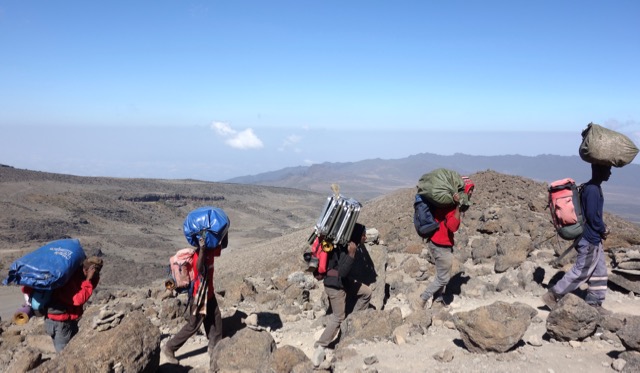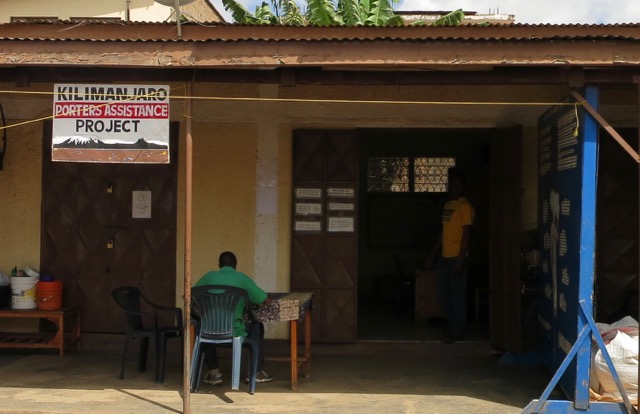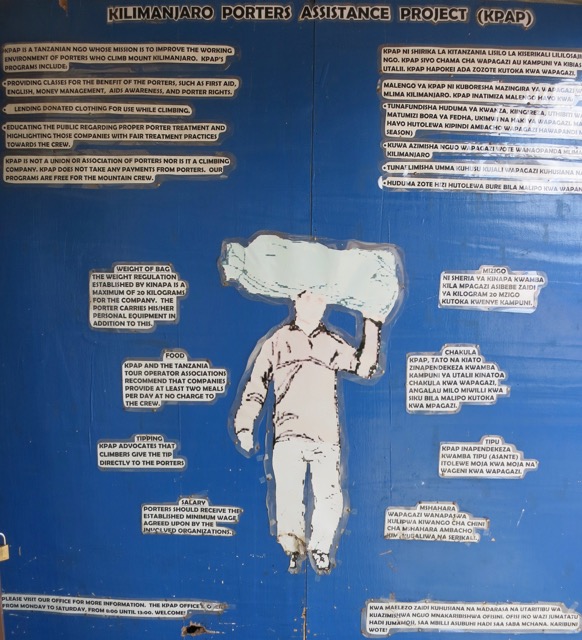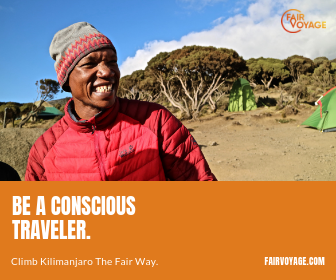Porters are the backbone of any Kilimanjaro climb. Without them, the majority of us tourists would never be able to summit. While we like to celebrate our summit achievements, it’s really the porters who make it all possible for us and do the heavy lifting. They rush up the mountain carrying our personal stuff, tents, food, and communal equipment, all on top of their own sparse necessities. Instead of resting when they finally arrive at camp, they set up our tents, fetch water, and prepare food so that everything is ready by the time their clients arrive.

Kilimanjaro porters – photo by Lynn Jackson
For all their hard labor, the porters of Kilimanjaro often don’t even receive three meals a day, sleep in substandard conditions, wear worn out sneakers that are entirely unsuitable to their strenuous, load-bearing treks, and need to make do with clothes that are inappropriate to protect them against the cold and rain. While hikers may believe they got a good deal from their operator in low-budget climbs, it actually means that their porters—despite all their misery—won’t even receive their due minimum wage of less than ten dollars per day!
In order to improve the working conditions of the porters on Kilimanjaro, the International Mountain Explorers Connection (IMEC) established the Kilimanjaro Porters Assistance Project (KPAP), a non-profit organization registered in Tanzania, in 2003. They are an independent organization examining treatment practices towards porters, amongst others.

KPAP main office in Moshi
All climbing companies can participate in KPAP’s Partner for Responsible Travel Program without any fees. To qualify as a KPAP Partner for Responsible Travel, companies will be scrutinized and need to obtain an 85% performance level in their porter treatment against a set of minimum standards established by the Kilimanjaro stakeholders.
That means other than treating their porters properly and proving this by attaining a minimum 85% performance level every season, it doesn’t cost operators anything to become a KPAP partner. So I see no reason why any operator wouldn’t want to participate, except of course that they are actually not treating their porters as well as they are trying to make us believe.

Education board for porters at KPAP’s office
Beware!
Many operators advertise on their websites that they are part of some porter welfare organization and treat their porters properly. Some even wrongly purport to be KPAP partner companies. Unfortunately, in most cases this is not true and pure marketing gimmick.
A myriad of poorly researched or outright misleading blogs and reviews make matters worse. While the issue of porter treatment and the importance of KPAP is well understood by the online community, many bloggers end up short-listing non-KPAP partner companies in their recommendations. I wonder who sponsors them . . . ?!
Fortunately, it’s easy to check who is a trustworthy operator. You will find them all listed as Partners for Responsible Travel on the KPAP website.
Why care?
Porter (mis)treatment is a real issue. I’ve heard many appalling true stories, including from my own guide who almost died when he started working as a porter for one of the big local operators: He woke up soaking wet in his tent that was leaking in the rain. Rather than giving him dry clothes, his operator made him continue to work in wet clothes on a snowy mountain until he fainted! Would you feel good about your summit success, knowing that something like this might happen to your own porter?
If not for altruistic reasons, here’s why you should also care for selfish reasons: You will rely on your porters to set up your tent properly, to boil your water properly, to prepare your food properly, to clean your communal toilet properly, and in the worst case to evacuate you down the mountain! Will your porters be able to do a good job if they are starving, freezing and earning half compared to their peers from the group camping next to yours?
Want to know more?
Please refer to the KPAP website for more information on their work and findings.
You will also find a lot more information in my book Kilimanjaro Uncovered, including:
- Thoughts and perspectives from my meeting with KPAP in Tanzania
- The full story of how my guide almost died when working as a porter
- Detailed recommendations how to select the best tour operator
Fair porter treatment is important. Please share and spread the word. To book your climb with a responsible tour operator committed to fair porter treatment, visit Fair Voyage.






Leave a Reply
You must be logged in to post a comment.